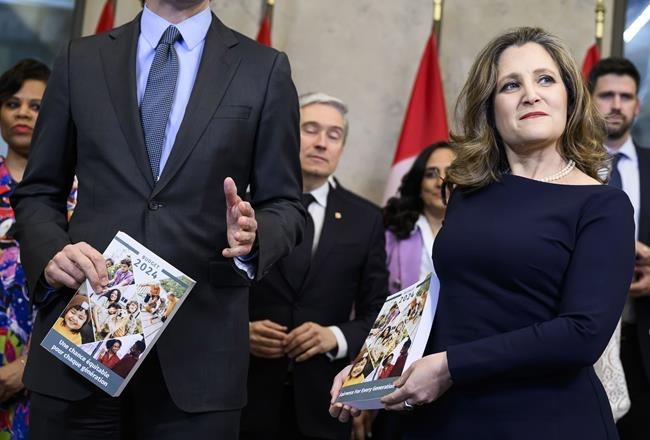OTTAWA — Canada's wealthiest individuals and corporations will soon pay taxes on a larger share of the capital gains they earn, a change that economists say will make the tax system more efficient, despite pushback from business groups.
The federal budget presented Tuesday proposes taxing two-thirds rather than one-half of capital gains — which refers to profit made on the sale of assets.
The increase in the so-called inclusion rate would apply to capital gains above $250,000 for individuals, and all capital gains realized by corporations.
The federal government estimates only 0.13 per cent of Canadians — or 40,000 people — will be affected by the higher inclusion rate.
The changes are expected to generate more than $19 billion in tax revenues over five years, which will help the Liberals pay for a slew of new spending on things like housing and national defence.
Business groups are crying foul over the changes, which will ultimately make the companies they represent pay more in taxes.
Organizations including the Canadian Chamber of Commerce and Business Council of Canada argue that making companies pay more will ultimately hurt economic growth and productivity.
But several economists are pointing out that the changes would bring capital gains taxation in line with other taxes, such as for dividends, which will actually help productivity and improve the system overall.
Michael Smart, a tax policy expert and economics professor at the University of Toronto, said the changes are a step in the right direction.
"This government is taking action because they need money badly, given the deficit situation. We should understand that," Smart said.
"But credit to them for doing a hard thing to fix a real inequity in our tax system, which allows very high-income individuals to, in some cases, pay a lower rate of tax than ordinary Canadians do because they're getting their income as capital gains."
Smart said the increase to the inclusion rate would also level the playing field for businesses and encourage better investment decisions, rather than ones that are the most tax-advantageous.
"We have had a system in Canada that favours capital gains, favours people holding onto assets to get gains, instead of getting dividends or selling assets to invest in a different stock or a different business venture and so on," Smart said.
"That's not good for productivity. We should move towards levelling the playing field so that all investors are paying a fair tax rate, given their incomes, at the same tax rate on every form of investment."
Trevor Tombe, an economics professor at the University of Calgary, said treating investments differently in the tax system also means resources are wasted on financial planning.
"This means that there will be more people employed, trying to sort out different accounting approaches to minimize the overall amount of tax payments and that that effort — that time, that labour — that's being spent on tax planning could have been spent on more productive uses," he said.
Tombe said businesses concerned about taxes being a drag on growth should advocate for a lower corporate tax rate, which is a separate matter from the inclusion rate.
Prime Minister Justin Trudeau defended the tax change on capital gains in an address to fellow Liberal caucus members Wednesday.
"We don't think it's fair that a teacher or electrician pays taxes on 100 per cent of their income while a multi-millionaire pays taxes only on 50 per cent of the passive income they make on capital gains, so we're gonna make them pay a little more," Trudeau said.
But for the Liberal government, the increase in the inclusion rate is about more than just fairness.
The additional expected revenues are helping Ottawa pay for tens of billions in new spending, thereby keeping the deficit at bay.
Tyler Meredith, a former head of economic strategy and planning for Finance Minister Chrystia Freeland, said raising the inclusion rate was the "obvious thing" to do.
"We are at a time in which we need more of everything. We need more houses, more health care, more defence, more decarbonization, and so on. And that is going to require a substantial amount of investment," Meredith said.
The fact the changes will only affect a small sliver of Canadians who also happen to be well-off takes away some of the political challenge, Meredith said.
A recent Leger poll found three-quarters of respondents supported a tax on personal wealth above $10 million and on very large corporate profits.
The poll of 1,525 adults taken last weekend cannot be assigned a margin of error because online polls aren’t considered statistically balanced samples, though the results were weighted for statistical accuracy.
This report by The Canadian Press was first published April 17, 2024.
Nojoud Al Mallees, The Canadian Press



